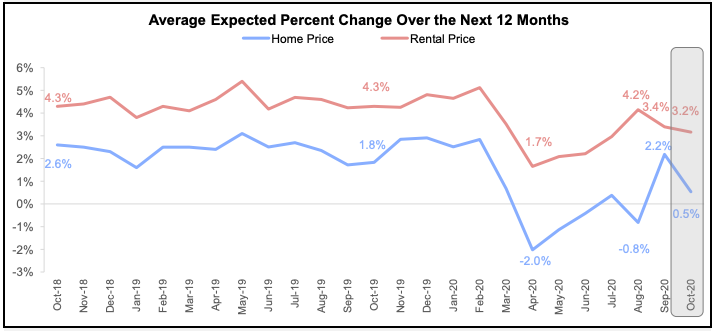After climbing for three straight months Fannie Mae's Home Purchase Sentiment Index (HPSI) stalled in November, declining 1.7 points to 80.0. The index based on six questions from the National Housing Survey, was 11.5 points lower than in November 2019.

The two most closely watched components of the index are those which measure consumers attitudes toward buying or selling a home and they diverged during the month. Those who thought it was a good time to buy dropped from 60 to 57 percent while those who said it was not a good time remained at 35 percent. This left the net good time responses at 22 percent, a 3-percentage point loss for the month and 10 points lower on an annual basis.
Selling sentiments moved in the opposite direction. The percentage saying it was a good time to sell remained at 59 percent while those responding on the negative side decreased 2 points. This left the net positive responses up 2 points at 26 percent. The component's score is still down 14 points from November 2019.
"The HPSI appears to have peaked for now as consumers continue to consider how COVID-19 impacts their ability to buy or sell a home," said Doug Duncan, Senior Vice President and Chief Economist. "This follows the HPSI's recovery of slightly more than half of the loss experienced during the first few months of the pandemic.
"Drilling down a bit, home purchase confidence has recovered more for homeowners than for renters, in part because homeowners have been less likely than renters to have had their jobs and finances impacted by the pandemic," Duncan continued. "Interestingly, the gap between the HPSI broken out by the homeowner and renter subgroups hit a survey high in August but, despite narrowing slightly, remains elevated and well above the survey average."

Consumers' expectations for home prices also gained ground. Those expecting higher prices ticked up 1 point to 41 percent while those who expect prices to fall dropped 7 points to 13 percent and responses of no change increased from 31 to 35 percent. As a result, the net share of Americans who say home prices will go up increased 8 percentage points month-over-month but was 6 points lower on an annual basis.
The third component on the positive side was the percentage of respondents who said their household income is significantly higher than it was 12 months ago. Their share increased from 23 percent to 24 percent while the percentage who say their household income is significantly lower dipped 2 points to 18 percent. Those who reported no change increased from 55 percent to 57 percent putting the net up 3 points to 6 percent.
In addition to the buying a home sentiment, net positive responses fell for two other components. The net share of those who expect mortgage rates to decline over the next year dropped by 14 points to a negative of 35 percent. Those who were not concerned about losing their job also fell to a net of 52 percent, down 6 points from October and 20 points lower than 12 months earlier.
The National Housing Survey from which the HPSI is constructed, is conducted monthly by telephone among 1,000 consumers, both homeowners and renters. In addition to the six questions that are the framework of the index, respondents are asked questions about the economy, personal finances, attitudes about getting a mortgage, and questions to track attitudinal shifts.







